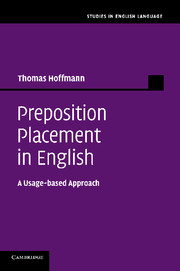Book contents
- Frontmatter
- Contents
- List of Figures
- List of Tables
- List of Abbreviations
- Acknowledgements
- 1 Introduction
- 2 Corroborating evidence: Data and methodology
- 3 Case notes: Independent factors
- 4 Evidence I: Corpus results
- 5 Evidence II: Experimental results
- 6 Preposition placement: The case for a Construction Grammar account
- 7 Conclusion: The verdict
- Online appendix
- References
- Index
2 - Corroborating evidence: Data and methodology
Published online by Cambridge University Press: 04 February 2011
- Frontmatter
- Contents
- List of Figures
- List of Tables
- List of Abbreviations
- Acknowledgements
- 1 Introduction
- 2 Corroborating evidence: Data and methodology
- 3 Case notes: Independent factors
- 4 Evidence I: Corpus results
- 5 Evidence II: Experimental results
- 6 Preposition placement: The case for a Construction Grammar account
- 7 Conclusion: The verdict
- Online appendix
- References
- Index
Summary
‘What counts as evidence in Linguistics’
As Penke and Rosenbach point out, ‘nowadays most linguists will probably agree that linguistics is indeed an empirical science’ (2004: 480). However, while the importance of empirical evidence is generally acknowledged by most researchers, the following quotations from Sampson and Chomsky show that there is no agreement among linguists as to the type of data that is to be analysed empirically:
We do not need to use intuition in justifying our grammars, and as scientists, we must not use intuition in this way.
(Sampson 2001: 135)You don't take a corpus, you ask questions … You can take as many texts as you like, you can take tape recordings, but you'll never get the answer.
(Chomsky in Aarts 2000: 5–6)If both Sampson's position on introspection and Chomsky's views on corpora were correct, there would obviously be no valid data base left for linguists to investigate. Fortunately, however, Sampson and Chomsky are only extreme proponents of their respective schools of linguistics. Nevertheless, when investigating a particular syntactic phenomenon, many linguists still only draw on either corpus or introspection data (though there seems to be an increasing number of exceptions such as Gries, Hampe and Schönefeld 2005, the collected volume by Kepser and Reis 2005 or the special issue on corpus and experimental techniques of Corpus Linguistics and Linguistic Theory 5.1 – in particular see Gilquin and Gries 2009).
- Type
- Chapter
- Information
- Preposition Placement in EnglishA Usage-based Approach, pp. 9 - 34Publisher: Cambridge University PressPrint publication year: 2011

